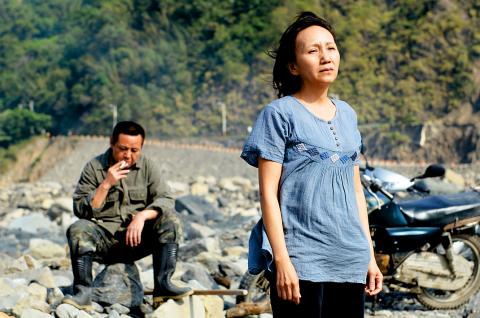Grief and healing take central stage in Kuo Chen-ti’s (郭珍弟) new film, The Boar King (山豬溫泉), which tells a deceptively quiet story of loss and rebirth inspired by the traumatic events when Typhoon Morakot devastated southern Taiwan in 2009. While it could have easily been made into a work of lachrymose sentimentality, the film thankfully doesn’t go in that direction. Instead, it looks at human suffering and pain with considerable restraint, buttressed by solid performances of Lu Yi-ching (陸弈靜) and Tsai Chen-nan (蔡振南).
Set in Baolai (寶來) in Greater Kaohsiung’s Liouguei Township (六龜), the film opens with home video footage of torrential flooding caused by Typhoon Morakot, as the off-screen cameraman witnesses the catastrophe in awe. The man’s name is Ying — played by Chen Mu-i (陳慕義) — who later disappears.
The widowed wife, Cho (Lu Yi-ching, 陸弈靜), is left with a hot spring lodge that barely survives the disaster. Seized by despair, Cho attempts and fails to commit suicide, having thought of her responsibility for Ying’s senile father, who lives with her. One day, Ying’s close friend Nan (Tsai Chen-nan, 蔡振南), a hunter, shows up at Cho’s door, offering to help rebuild the mountain inn. A reticent man, Nan has kept his tender feeling toward Cho for years.

Photo courtesy of Good Day Films
Ying’s death also brings back Cho’s step-daughter Fen (Wu I-ting, 吳伊婷), who works mundane jobs in the city. Amid grief, she meets land surveyor Garmin, played by Soda Voyu from Seediq Bale (賽德克巴萊), and love starts to bud between the two.
Meanwhile, the villagers are forced to leave the devastated area, selling their homes to a resort development company. But one by one, they receive invitations sent by Ying before he died to a banquet set to be held at the inn. Perplexed, Cho looks to the home videos shot by her late husband, hoping to unravel the secret of his death.
Five years after her less than satisfactory debut feature Step by Step (練戀舞), Kuo has returned here with a finely executed and honest work filled with lyrical moments. The polished cinematography by Paotao (寶島) allows for the full expression of nature, whether a collapsed mountain slope, a riverbed studded with massive rocks, lush woods and hidden trails.
At times, sequences from the home videos shot by Chen’s character are inserted in and fused with the present narration, not only providing clues to the man’s thinking and his mysterious disappearance, but serving a link that enables the living to search for and reconnect with the dead and to come to terms with their grief.
The daughter’s reconnection with her father also raises the issue of land and homecoming. “The mountain road to home is no longer obstructed, don’t you think?” she says to her lover. However, much of the film’s failing lies in its rather flaccid effort to explore the young woman’s transformation. Her off-screen narration appears superfluous, adding nothing significant to the story, and theater actress Wu delivers the role with punctuated intensity that sometimes belongs to the stage rather than in front of the camera.
The crowning moments in The Boar King ultimately belong to veteran thespians Lu and Tsai. In a scene toward the end, Nan recounts an unforgettable encounter with a wild boar to Cho. We follow Nan’s resonant voice into the woods, where hot spring water flows, lives are intertwined and life quietly goes on.

In the March 9 edition of the Taipei Times a piece by Ninon Godefroy ran with the headine “The quiet, gentle rhythm of Taiwan.” It started with the line “Taiwan is a small, humble place. There is no Eiffel Tower, no pyramids — no singular attraction that draws the world’s attention.” I laughed out loud at that. This was out of no disrespect for the author or the piece, which made some interesting analogies and good points about how both Din Tai Fung’s and Taiwan Semiconductor Manufacturing Co’s (TSMC, 台積電) meticulous attention to detail and quality are not quite up to

April 21 to April 27 Hsieh Er’s (謝娥) political fortunes were rising fast after she got out of jail and joined the Chinese Nationalist Party (KMT) in December 1945. Not only did she hold key positions in various committees, she was elected the only woman on the Taipei City Council and headed to Nanjing in 1946 as the sole Taiwanese female representative to the National Constituent Assembly. With the support of first lady Soong May-ling (宋美齡), she started the Taipei Women’s Association and Taiwan Provincial Women’s Association, where she

Chinese Nationalist Party (KMT) Chairman Eric Chu (朱立倫) hatched a bold plan to charge forward and seize the initiative when he held a protest in front of the Taipei City Prosecutors’ Office. Though risky, because illegal, its success would help tackle at least six problems facing both himself and the KMT. What he did not see coming was Taipei Mayor Chiang Wan-an (將萬安) tripping him up out of the gate. In spite of Chu being the most consequential and successful KMT chairman since the early 2010s — arguably saving the party from financial ruin and restoring its electoral viability —

It is one of the more remarkable facts of Taiwan history that it was never occupied or claimed by any of the numerous kingdoms of southern China — Han or otherwise — that lay just across the water from it. None of their brilliant ministers ever discovered that Taiwan was a “core interest” of the state whose annexation was “inevitable.” As Paul Kua notes in an excellent monograph laying out how the Portuguese gave Taiwan the name “Formosa,” the first Europeans to express an interest in occupying Taiwan were the Spanish. Tonio Andrade in his seminal work, How Taiwan Became Chinese,